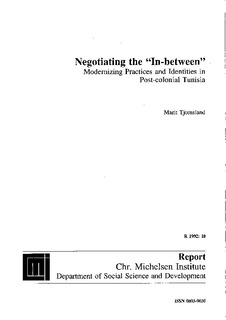| dc.contributor.author | Tjomsland, Marit | |
| dc.date.accessioned | 2008-03-13T08:50:06Z | |
| dc.date.accessioned | 2017-03-29T09:11:58Z | |
| dc.date.available | 2008-03-13T08:50:06Z | |
| dc.date.available | 2017-03-29T09:11:58Z | |
| dc.date.issued | 1992 | |
| dc.identifier.issn | 0803-0030 | |
| dc.identifier.uri | http://hdl.handle.net/11250/2435722 | |
| dc.description.abstract | The study focuses on the Tunisian post-colonial process of modernization and its effects on Tunisians of different generations, gender, and educational backgrounds. Interviews with illiterates as well as university graduates show that level of education contributes more to a modernization of individual preferences than both gender and generation. Gender is, however, the main determining factor for how educated "modernized" Tunisians experience and handle their intermediary positions between tradition and modernity. | |
| dc.language.iso | eng | |
| dc.publisher | Chr. Michelsen Institute. Department of Social Science and Development | |
| dc.relation.ispartofseries | Research report | |
| dc.relation.ispartofseries | R 1992: 10 | |
| dc.subject | Modernization | |
| dc.subject | Gender relations | |
| dc.subject | Tunisia | |
| dc.title | Negotiating the "In-between". Modernizing Practices and Identities in Post-colonial Tunisia | |
| dc.type | Research report | |
